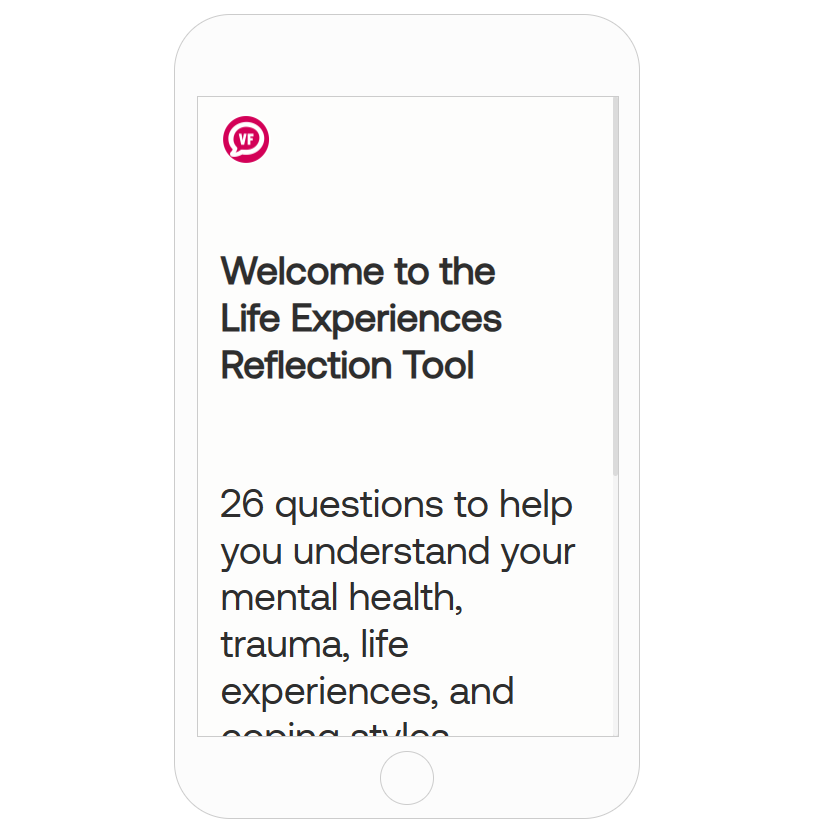
Welcome to the Life Experiences Reflection Tool
- Understand your traumas and distressing experiences
- Learn about your coping styles and mechanisms
- Explore your beliefs, thoughts, and biases
- Receive a free personalised trauma profile
A completely anonymous, free interactive tool comprising of 26 questions that could help you to understand yourself better
About the Life Experiences Reflection Tool (2024)
- This questionnaire will ask you to consider your life experiences since you were born, to give you a picture of the things you have lived through up to now, and how they may be impacting you
- It is completely free and anonymous
- You can use this tool as many times as you like
- At the end of the questionnaire, you will be presented with a personalised profile of the types of trauma, distress, experiences, and coping mechanisms you have
- You will be able to download your personalised results at the end of this questionnaire to keep
- This is not a diagnostic tool of any kind, but it will help you to identify trauma and distress that may be affecting your life
- This tool is based on the APTI principles of trauma-informed working by VictimFocus and Dr Jessica Taylor. It is a safe, ethical way of exploring your own experiences without labelling or stigma
- Anyone over the age of 16 can use this tool
- You may find that the tool reveals traumatic and distressing experiences that you had not processed or recognised before. For this reason, your personalised profile will contain links to further support, and advice about seeking help
- The designer of this free tool is Chartered Psychologist, Dr Jessica Taylor
- To contact the designer, email Jessica@victimfocus.org.uk, or use our contact form on this website
Content warning
This interactive tool will ask you to think about hundreds of different life experiences that you may never have thought of before. You may begin to recognise that you have been subjected to trauma, abuse, discrimination and other harms that you had not considered.
Please ensure you are in a safe and supportive environment to use this tool, and if you need support to do this, consider using the tool with someone you trust, or a professional.
Using the Life Experiences Reflection Tool
Understanding trauma
So, what is trauma? Does it have to be a big, one-off event in your life to qualify as a 'real trauma'? A car crash, an earthquake, a rape, a near death experience, perhaps?
Trauma is not at all well-defined, and so it is better to understand our trauma as a personal and individual experience. What could traumatise one person may not affect another. Our experiences of trauma could range from being constantly put down and bullied by our parents through to being subjected to the humiliation of our nudes being leaked online by our ex.
There are thousands of possible experiences that could profoundly traumatise and harm you. We live in a complicated world, very often in unnatural environments that are filled with pressures, expectations and narratives that do not benefit us in any way.
We define trauma as any event in which you are, or perceive yourself to be, seriously harmed or likely to be seriously harmed. We also include traumas that occur as we witness and support the traumas of other people (vicarious trauma and secondary trauma).
Our perception is important here, as we can often be in very traumatic situations, relationships and environments but not realise until much later. Similarly, we can be traumatised by something smaller that later in our lives, we are confused as to why it had such a massive impact on us.
Every experience listed in this questionnaire has the potential to traumatise each and every one of us, but whether it does, and to what extent, is personal and individual. However, this questionnaire is not exhaustive, and there are likely many traumatic experiences you have been through in your life that were not listed here.
About your trauma responses
Our trauma responses can be psychological, physical, social, spiritual or, more often than not, a big mixture of all of those. Responses to trauma are the hundreds of ways our mind and body reacts to how distressed and traumatised we are.
Some examples of common psychological trauma responses include: shock, intrusive memories and thoughts, feeling sad and hopeless, feeling angry, feeling betrayed, blaming ourselves, feeling guilty, feeling numb, feeling confused and many others.
Some examples of common physical trauma responses include: feeling or being sick, hair loss, not being able to have sex, trouble eating, shaking, sweating, trembling, muscle spasms, trouble sleeping, aches and pains, bowel and gut problems, developing intolerances to food and medication, constantly getting ill with viruses and infections.
In the Indicative Trauma Impact Manual (2023), we list hundreds of trauma responses, so that everyone can understand how their body and mind is reacting to their distress. It is common for you to feel many of these at once, or for some to come and go over time. Some people will experience none of them, and some people will experience hundreds. We are all unique and individual.
Understanding our trauma responses and what they mean to us is a vital first step to processing everything we think and feel about ourselves, our lives, and about others.
About your coping mechanisms
Coping mechanisms are behaviours, ways of thinking and feeling that develop whilst we are being traumatised or distressed (and afterwards), as a way of coping with our trauma responses.
Coping mechanisms are common, and most people have a mixture of them. You may need to sit and think about your own coping mechanisms for a while in order to identify them. There will be the obvious ones that come to you right away such as knowing that you often feel like you want a glass of wine or to smoke some weed when you are feeling extremely stressed or anxious - but there will be others that are not so obvious at first.
You may notice for example, that your coping mechanisms include perfectionism, rituals, patterns of behaviours, pushing people away, self-sabotage, overworking, becoming obsessed with things, developing beliefs and rules for yourself, trying to protect yourself or denying things have happened.
Just like our trauma responses, our coping mechanisms are completely unique and individual. Everyone copes in different ways, this is why when a distressing event happens to two people, one may become withdrawn, sad, and feel like ending their life, but the other one may throw themselves into working, avoidance, distraction, and even doing things like raising money to help others.
Understanding our coping mechanisms, when they developed, how they developed and what purpose they serve is a vital first step to understanding our mental health and our wellbeing.
Understanding our APTI (anti-pathology, trauma-informed) approach
Developed by Dr Jessica Taylor in 2023, APTI formed part of a book called the 'Indicative Trauma Impact Manual' or ITIM by Jaimi Shrive and Jessica Taylor.
APTI is an approach to understanding human distress and mental health which considers that a change in behaviour, thought, or emotion arises from past or current trauma, distress, oppression, or harm. Within this context, trauma can be variable and dynamic. Whilst trauma was historically considered to be a one-off, life-threatening event, it is now accepted to encompass any event or set of events that cause deep distress, disturbance, oppression, fear, harm, or injury.
An anti-pathologising, trauma-informed approach is opposed to the labelling, medication, pathologisation and problematising of humans. Instead of seeking what is ‘wrong’ with the individual (whether that is called a ‘mental health issue’ or a ‘disorder’), the APTI approach supports the individual from the perspective that their responses to distress are normal, natural, justified, understandable, and valid. Therefore, an anti-pathology, trauma-informed approach does not engage in systems or narratives which seek to position the individual as having an internal issue that needs to be diagnosed, treated, managed, or solved with therapy, medication, or social isolation. Rather, an APTI approach seeks to explore, identify and validate the experiences of oppression, harm and distress in the life of the person and then protect them from medicalisation and institutional harm.

